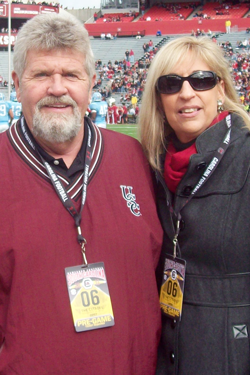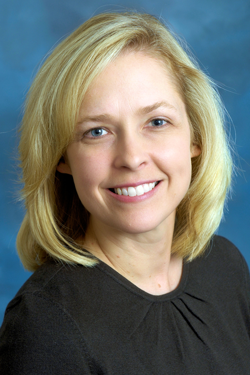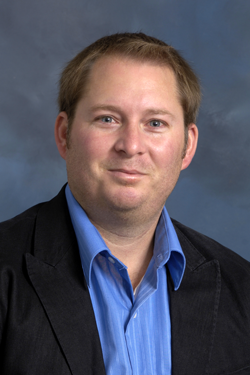Arnold School faculty are in the limelight
January 25, 2012

Dr. Sara Corwin and her husband Larry Parker were guests of the Athletics Department for the USC-Citadel game in recognition of Corwin's support for the academic success of student-athletes.

Dr. Susan Steck is leading a three-year study on reducing prostate cancer in African-American men.

Dr. Sean Norman has received a grant from the U.S. Office of Naval Research.
Sara Corwin recognized for her work to support academic success of student-athletes
If you noticed someone who looked a lot like Dr. Sara Corwin from the Arnold School's Department of Health Promotion, Education, and Behavior on the football field during the USC Gamecocks-Citadel game, then your eyes didn't deceive you!
Selected as an honoree for the Guest Coach Program of the USC Department of Athletics, Corwin was invited to attend a home football game during the 2011 season and be recognized for her dedication to student-athletes. The program was established to provide student-athletes and academic staff an opportunity to recognize faculty and/or staff members who have made a positive impact on the academic careers of USC athletes.
Corwin, the undergraduate director for the Arnold School's Public Health Program, doesn't know who nominated her. But the Arnold School does have numerous student-athletes in its undergraduate programs and classes, including members of football, cross country, baseball and softball teams and men and women's soccer/track/basketball/swimming/golf teams.
"The Guest Coach Program recognizes USC faculty and staff who support student-athletes in their desire to excel academically and in their sport," Corwin said. "I recognize that both can be extremely demanding for student-athletes -- not only in terms of their time, but in terms of focus, managing multiple demands and unique stressors that come from the responsibilities of being a student and a USC representative for our athletics department."
Corwin said she tries to offer support by linking students to on-campus resources, by listening to them, and by coordinating their studies with their athletics advisers to create the best possible schedule and program that will help them succeed on and off the field, court or track.
On the day of the game, Corwin attended a talk with football recruits and their family members and watched a video on the history of Williams-Brice Stadium and USC's football program. She also was invited to hear the football coaching staff, including Coach Steve Spurrier, talk about the program at USC and the emphasis on academics and character, as well as a winning football program. "The academic advising team also addressed us and explained how they work with the students and emphasized the importance of excelling in the classroom," she said.
The full schedule included brunch and the opportunity to be on the field for pre-game, warm-up activities, she said.
"The best part of the day – aside from watching the Gamecocks win -- was, by far, lining up with the USC band and cheerleaders at the tunnel and cheering as the players ran on the field to the music of 2001: A Space Odyssey," she said. "The excitement of the historical tradition was overwhelming with 82,000-plus fans cheering and the music creating such positive energy!"
Corwin and other honorees had prime seats on the 50-yard line to watch the Gamecocks defeat The Citadel bulldogs, 41-20 – a win that was part of the record 11 victories for the football team.
An avid sports fan, Corwin said she wouldn't mind being a football player in her next life. "I love all types (of sports) and have a deep appreciation for the dedication and work it takes to be an athlete. I was not blessed with any kind of athletic ability or coordination, so I admire folks who do!"
Corwin's sister and her friend Dr. Kara Montgomery, also on the faculty in HPEB, were competitive swimmers. "I appreciate not only the physical conditioning from a health/wellness perspective, but know that student athletes make incredible sacrifices to do what they love, to be part of a team, and to be successful ('win')," she said.
"I know first-hand what it takes, and it isn't easy. So, any support I can provide I do!"
Sean Norman awarded grant for study on use of bacteria to convert organic materials into electricity
Dr. Sean Norman of the Arnold School of Public Health has received a grant from the U.S. Office of Naval Research to study microbial fuel cells and electrical power generation.
The three-year, $224,795 grant to Norman, an assistant professor in the department of environmental health sciences, will focus on the need to increase the proton permeability of PEMs, proton exchange membranes, used in microbial fuel cells (MFCs).
MFCs are recognized as a new method of renewable energy recovery – the fuel cells rely on bacteria to convert organic materials into electricity.
"While MFCs have the potential to provide a substantial amount of sustainable energy, the ability to scale-up the process has been hindered by a fundamental limitation in the currently available proton exchange membranes that are critical to MFC operation," said Norman, the director of the Microbial Molecular Laboratory at the Arnold School.
"In this project, we will examine ways to significantly enhance the electrical power output of MFCs through the use of a microbial-based proton exchange membrane," he said.
To determine the feasibility of this approach, Norman's research group will use the new Pacific Biosciences DNA sequencing capabilities of the Environmental Genomics Core Facility at USC to identify which microbes have a role in proton transfer and their level of activity within the MFC.
The grant builds on other research under way in Norman's laboratory. A study funded by the U.S. Department of Energy is looking at the use of microorganisms for the conversion of carbon dioxide to butanol, a fuel source considered superior to ethanol.
"While the Navy proposal is examining the use of microbes for sustainable electrical power generation, the DOE project is looking at using microbes for the sustainable production of biofuels," he said. "While not directly related, both projects require the use of proton exchange membranes. The knowledge gained from the current project with the U.S. Navy will very likely enhance our efforts and understanding of biofuel production for the DOE project."
The study will involve a graduate student, who will spend each summer working at the Naval Research Laboratory. The student researcher will convert the knowledge gained from lab-based experiments into application-based approaches, Norman said.
The study has implications for off-grid energy production, including buoys deployed in the ocean for monitoring various meteorologic data or as a possible future energy supply for ships, he said.
Susan Steck awarded grant for study on prostate cancer in African-American men
Arnold School researcher Dr. Susan Steck has begun a three-year study aimed at reducing disproportionally high levels of prostate cancer in African American men.
The $706,958 study, "Vitamin D and Related Genes, Race and Prostate Cancer Aggressiveness," is funded by the Department of Defense Prostate Cancer Research Program.
The overall goal of the study is to examine the association between vitamin D status and prostate cancer aggressiveness in African-American and European- American men using data and biologic samples from the PCaP study (North Carolina-Louisiana Prostate Cancer Project), previously conducted in the Southeast, said Steck.
Prostate cancer is the most commonly diagnosed cancer in men, accounting for 30 percent of all cancers in men. African-American men are at highest risk for the deadly disease. From 2000 - 2006, the average annual incidence of prostate cancer among African-American men was 60 percent higher than among Caucasian men.
In 2007, the prostate cancer death rate among African-American men was approximately three times as high as that of Caucasian men.
Half of the participants enrolled in the PCaP study are African American, said Steck, who joined the Arnold School faculty six years ago and is affiliated with the Cancer Prevention and Control Program and the Center for Research in Nutrition and Health Disparities.
"This is particularly important in studying vitamin D status because African Americans have lower levels of serum vitamin D than European Americans," she said.
Vitamin D is a hormone that is present in the diet in a limited number of foods, such as fatty fish, dairy products, and fortified cereal and orange juice. But the majority of vitamin D in humans comes from sun exposure, Steck said.
Vitamin D beneficially affects cellular processes involved in carcinogenesis. However, vitamin D deficiency is common in the United States, especially among African Americans.
"Previous studies of vitamin D and prostate cancer have yielded mixed results (some have even suggested that high vitamin D status may be associated with increased risk of prostate cancer). Many of these have not included appreciable numbers of African Americans, so our study will improve upon existing studies," she said.
Many men may have cancer cells in their prostate, Steck said, but these may never cause symptoms or harm. Treatment can have more risk than benefit in these men.
"Some prostate cancers, however, are aggressive or advanced and these need to be treated," she said. "Currently, there is no good screening tool for distinguishing between these two types of cancers. So, we will focus on the risk of highly aggressive cancers in this study to try and determine if lifestyle or genetic factors can help prevent or predict aggressive prostate cancer."
Collaborators for the USC study include Dr. Hongmei Zhang of the Department of Epidemiology and Biostatistics; Dr. Angela Murphy of the USC School of Medicine; and Dr. Mark Davis of the Department of Exercise Science and the Environmental Genomics Core. Additional collaborators are at the Roswell Park Cancer Institute in New York, the University of North Carolina at Chapel Hill, and the University of California at Los Angeles.
She earned her bachelor's degree in mathematics from the University of Notre Dame in 1992. At the University of North Carolina at Chapel Hill, she earned a master's of public health in nutrition in 1997 and a doctorate in nutrition in 1999.
A pilot grant to Steck from the Center for Research in Nutrition and Health Disparities led to preliminary data to support the grant proposal.



_01.jpg)
_02.jpg)